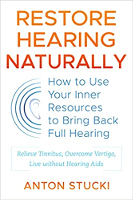Narrated by Marie T. Russell
Video version of this article
In the great ancient civilizations, not the eye, but the ear was considered our noblest sense. “The ear is the way” it says in the Upanishads, the registry of Indian wisdom. -- E. Berendt
Sound is always present. Something audible is continuously happening all around us. We constantly hear, whether or not we like it. The ear cannot close naturally; it has no lid, no muscle, no reflex that could consciously create a barrier between our acoustic perception and the outside world. We listen to sounds from the start of life and for the duration of our entire life.
All around us is an often unnoticed acoustic cosmos that is constantly re-creating itself, expressing and communicating all the evolutionary processes in a buzzing and resonant way. The entire universe is filled with sounds, waves, and vibrations. Astronomers can measure cosmic background noise coming from all directions.
Get The Latest By Email
How Trauma Affects Hearing
We don’t just suddenly hear poorly for no apparent reason. The cause is always an event: we have experienced something that hurt us either physically or psychologically. What I hear can hurt quite a bit. Words can hurt us just like the loud bang of an explosion. If the injury that results from this kind of exposure does not heal completely, the functionality of the associated organ does not completely return to balance.
If we experience an event as traumatic, this affects the ear’s physical functioning—I cannot make use of my system’s full capabilities. Similarly, the shock and pain of an acoustical traumatic event reduces my ability to process auditory information. In the past, the conventional medical model understood the causes of hearing impairment to be the result of inflammatory processes and diseases, genetic predisposition, or injury.
If our body is injured, it can heal again as long as the affected organ is still present, nourished through the body’s own supply channels, which are connected to the nervous system. This not only applies to our body as a whole but also, in a special way, to our sense of hearing. Our hearing system has enormous capabilities and is able to compensate for significant losses, meaning we have two ears that can perform -independently of each other.
If we experience a traumatic event, our entire body-mind-spirit reacts to it. A traumatic event is always an overload to our system that leads to a weakening. However, what constitutes an overload is different for each person.
For example, a heated argument with terrible insults may be deeply distressing for one person but may be insignificant to another. We might respond to verbal abuse with fear or anger, or we might shrug our shoulders and simply walk away. Depending on what we feel, the strain of the trauma is also felt differently in the body.
However, if fear is the response to a trauma, an almost universal reaction is to freeze, to feel paralyzed. How strong this reaction is and how long it lasts depends on how deeply this fright has entered our psyche and “sits in our bones.”
By understanding how we respond to trauma, we can make the processing and resolution of its physical symptoms more successful.
The 3 Types of Hearing Trauma
The cause of hearing impairment involves any of 3 types of trauma:
* Accident, injury, or illness that results in a lasting impairment
* Physical overload of hearing as a result of a one-time event (a loud explosion) or a sustained acoustic event (ongoing high level of noise in the workplace)
* A listening experience with traumatic emotional content (one-time or repeated verbal abuse)
1. Accident, Injury, Illness
Even if our hearing has been injured, it usually heals as long as the physical basics still exist, just as a cut on our finger heals eventually. Even if our hearing no longer functions perfectly as before, we still have the potential to restore it.
Let’s consider a limited weakening of hearing; for example, in children after a middle-ear infection. The body may have healed from the illness, but on the soul level the shock of the illness has not yet been processed.
So despite the fact that there has been a physical recovery, as a result of the shock to the system, the full functioning of auditory processing has not yet been restored. This is because restoration can only be done by the brain after it has processed the traumatic content on an emotional / soul / spirit level.
2. Physical Overload of Noise
In a physical overload of noise as a result of either a one-time stressful event or persistent stress (for example, high levels of noise in the workplace), the results are basically the same as with an accident or an injury.
In the case of exposure to a sustained acoustic overload, exposure to the acoustic stressor must completely end so that the body can switch to regulation and regeneration mode. It’s not important whether the acoustic burden is officially classified as harmful (for example, according to the requirements of occupational safety).
The only decisive factor here is the subjective feeling of the listener. When a noisy environment or a certain type of noise (for example, the often high-frequency whistle emitted by certain ventilation and air-conditioning systems) is classified by one’s own system as a burden or overload, then it is a threat to that person from a biological point of view, no matter what the actual decibel level is.
The response of one’s own body to the acoustic stressor is always based on individual sensation that is personally experienced. And it is only when we have discovered and solved the traumatic background that we can begin to deal with the stress brought on by that trauma.
So the individual’s personal response to acoustic stress is paramount. And it usually is not enough to reduce the exposure to stressful noise with hearing protection, because the noise is subjectively still perceived as a burden, even when the sound is objectively lower due to the protective measures. Therefore, first and foremost, the external noise load must be completely eliminated. This is often difficult in practice when it comes to a noisy job or a living situation where one is continuously exposed to noise (such as living near a road or an airport).
Often people think that if the noise is below what’s considered allowable stress levels, they feel they should just accept the burdensome situation. That’s because they don’t understand the subjective factor in hearing trauma.
Of course, you can also work in parallel with some form of therapy while you reconstruct your sense of hearing. But if you are still exposed to the overload of noise, the therapy is usually not particularly effective because your perceptual system will continue to view the acoustic stress as a burden and remain in protective mode.
On the other hand, someone who works without hearing protection and regularly uses a tool like an angle grinder or a circular saw might find that their brain reduces the burden of the subjective perception of noise, such that the noise is no longer heard as loud or disruptive.
As a child, I used to live on a street with a tram. Very often, when it went around the bend, it squeaked. At first, I woke up startled. After a few weeks, though, I barely registered the squeaky sound when the tram went by. I had gotten used to the sound. My system recognized it as familiar and nonthreatening, and so had hidden the high-pitched frequencies so that they wouldn’t bother me anymore. This is also how it might work if you regularly use a power tool.
However, if you stop using the angle grinder regularly, you’d have to teach your brain to hear those frequencies again, since your system has learned to block out those frequencies. This kind of retraining often feels strange in the beginning because your whole system is focused on not hearing those frequencies, and so it doesn’t. This is what allowed you to handle the situation in the past. In addition, if those frequencies have been especially loud and burdensome, your system might have been weakened within this range of frequency on a physical and organic level.
3. Listening Experience with Traumatic Emotional Content
Traumatic events do not necessarily involve physical force. Our soul and consciousness are involved in every event. How our soul perceives an event is of utmost importance and determines our consciousness.
In conjunction with the brain, the soul and consciousness process sensory impressions absorbed by the body. If your internal perceptions don’t agree with your external reality, you may not be able to accurately locate or perhaps even hear certain frequencies. This kind of listening trauma, which is often indistinguishable from trauma resulting from organic impairments or accidents, can be caused by emotionally traumatic acoustic events.
The physical component is not the only deciding factor, and not every painful situation affects a person physically. Unless accidents or injuries have occurred, diseases and the dramatic weakening of our systems and capabilities always start with situations or events that were too much for us. These catch us off guard, or are the final straw, so to speak.
Dealing With All Three Factors At Once
When we have to deal with all three factors (shock, isolation, and acute and dramatic personal threat) within a single cognitive event at once, that experience becomes existential and kickstarts our body’s survival program—our last resort, one could say.
■ Shock: A shock can result in a state of paralysis—I freeze. The situation is so powerful that I have no idea what I can do or how I can escape it or resolve it. It’s like the mouse that turns the corner and unexpectedly faces the cat. It instinctively senses that any movement could mean death. If it moves, the cat will be on it, so the mouse freezes. Like the poor mouse, the event catches us completely off guard—it’s something we didn’t expect at all.
■ Isolation: This is the feeling of being all alone in the world, without any help or support, no matter how many people may be around. If the little fawn is separated from its mother, it is isolated, which poses the highest level of risk. If the mother can’t find the fawn it is without any support for survival.
Isolation from the group or family can mean mortal danger. If my boss puts me down in front of the whole team, I will feel isolated from my colleagues, and this will make me feel that my very survival at work is threatened.
■ Personal threat: This means that the situation or the event has some meaning to me personally. It’s about something important to me. As a result, I lose face, I feel that I’m worthless, that I’m no longer loved, that I’ve lost everything. The situation represents a threat, so I cannot just ignore it.
When the triggering event combines feelings of shock, isolation, and high drama, our entire system becomes overloaded. When these three factors come together in a situation where what we hear is part of the conflict, an essential aspect of the whole event, our sense of hearing can become impaired. In other words, our sense of hearing can become seriously weakened if we have experienced one or more situations in which these three factors came together and restricted our sense of hearing. A constant drip of water wears away the stone.
We can heal this kind of trauma by processing the triggering event, which helps to strengthen our sense of hearing. I’m not saying that it’s easy, but it’s worth it, and in each of us there is more strength and resilience than we sometimes think. A central aspect for me to mobilize this force is in understanding the context so that I can gain confidence that this work makes sense because it is in accordance with the order of nature.
©2018 (in German) & 2020 (translation). All Rights Reserved.
Reprinted with permission of the publisher, Healing Arts Press,
an imprint of Inner Traditions Inc. www.innertraditions.com.
Article Source
 Restore Hearing Naturally: How to Use Your Inner Resources to Bring Back Full Hearing
Restore Hearing Naturally: How to Use Your Inner Resources to Bring Back Full Hearing
by Anton Stucki
Through hearing we are connected with everything that surrounds us. Yet millions of people, young and old, suffer from hearing loss, which disrupts this special connection not only with our surroundings but also with our friends, loved ones, and coworkers. As Anton Stucki reveals, onset hearing loss as well as other conditions of the ear canal, such as tinnitus, industrial hearing loss, and vertigo, are not part of our normal physiological aging process. The brain is naturally able to compensate for hearing loss, even in situations with loud background noise, yet as we age, we often lose this adaptive ability.
For more info and/or to order this book, click here.

About the Author
Anton Stucki is an audio expert, well known in Germany for his hearing recovery system. For over 10 years he has helped thousands of people restore their hearing and has trained medical practitioners and therapists to use his system. He lives in Brandenburg, Germany.









